Quanjun Chen
STAEformer: Spatio-Temporal Adaptive Embedding Makes Vanilla Transformer SOTA for Traffic Forecasting
Aug 26, 2023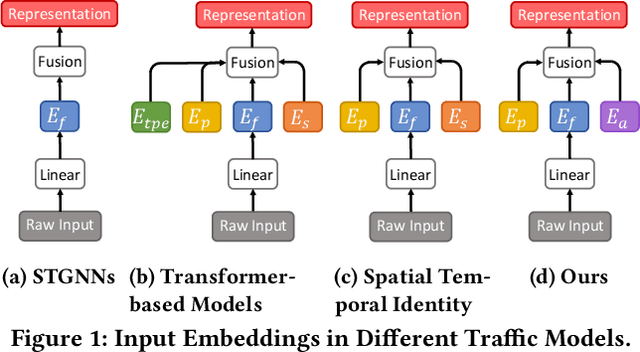
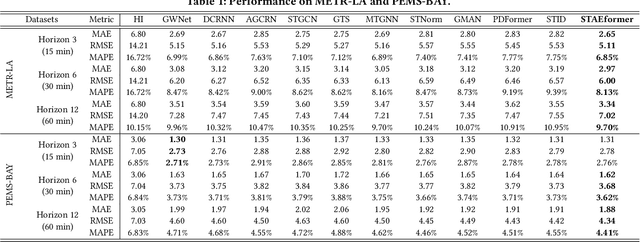

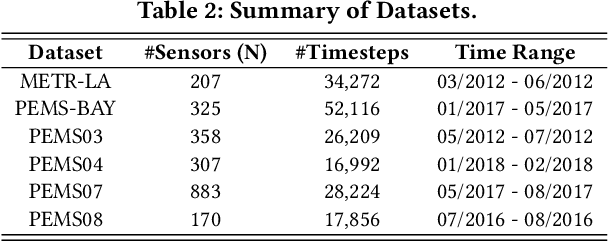
Abstract:With the rapid development of the Intelligent Transportation System (ITS), accurate traffic forecasting has emerged as a critical challenge. The key bottleneck lies in capturing the intricate spatio-temporal traffic patterns. In recent years, numerous neural networks with complicated architectures have been proposed to address this issue. However, the advancements in network architectures have encountered diminishing performance gains. In this study, we present a novel component called spatio-temporal adaptive embedding that can yield outstanding results with vanilla transformers. Our proposed Spatio-Temporal Adaptive Embedding transformer (STAEformer) achieves state-of-the-art performance on five real-world traffic forecasting datasets. Further experiments demonstrate that spatio-temporal adaptive embedding plays a crucial role in traffic forecasting by effectively capturing intrinsic spatio-temporal relations and chronological information in traffic time series.
MegaCRN: Meta-Graph Convolutional Recurrent Network for Spatio-Temporal Modeling
Dec 12, 2022

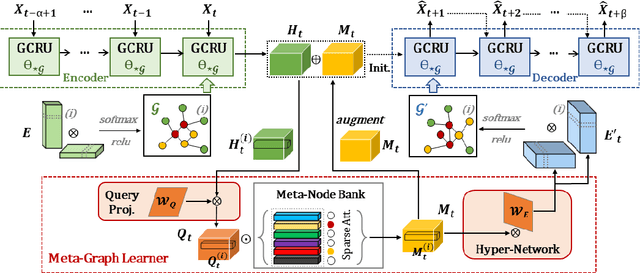
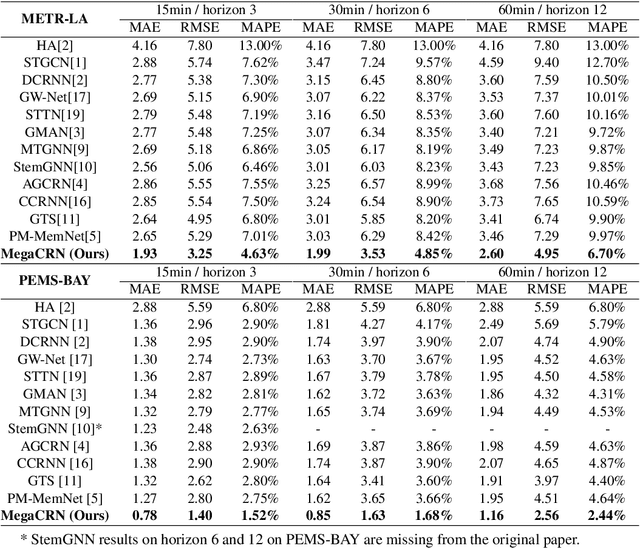
Abstract:Spatio-temporal modeling as a canonical task of multivariate time series forecasting has been a significant research topic in AI community. To address the underlying heterogeneity and non-stationarity implied in the graph streams, in this study, we propose Spatio-Temporal Meta-Graph Learning as a novel Graph Structure Learning mechanism on spatio-temporal data. Specifically, we implement this idea into Meta-Graph Convolutional Recurrent Network (MegaCRN) by plugging the Meta-Graph Learner powered by a Meta-Node Bank into GCRN encoder-decoder. We conduct a comprehensive evaluation on two benchmark datasets (METR-LA and PEMS-BAY) and a large-scale spatio-temporal dataset that contains a variaty of non-stationary phenomena. Our model outperformed the state-of-the-arts to a large degree on all three datasets (over 27% MAE and 34% RMSE). Besides, through a series of qualitative evaluations, we demonstrate that our model can explicitly disentangle locations and time slots with different patterns and be robustly adaptive to different anomalous situations. Codes and datasets are available at https://github.com/deepkashiwa20/MegaCRN.
Spatio-Temporal Meta-Graph Learning for Traffic Forecasting
Dec 08, 2022



Abstract:Traffic forecasting as a canonical task of multivariate time series forecasting has been a significant research topic in AI community. To address the spatio-temporal heterogeneity and non-stationarity implied in the traffic stream, in this study, we propose Spatio-Temporal Meta-Graph Learning as a novel Graph Structure Learning mechanism on spatio-temporal data. Specifically, we implement this idea into Meta-Graph Convolutional Recurrent Network (MegaCRN) by plugging the Meta-Graph Learner powered by a Meta-Node Bank into GCRN encoder-decoder. We conduct a comprehensive evaluation on two benchmark datasets (METR-LA and PEMS-BAY) and a new large-scale traffic speed dataset in which traffic incident information is contained. Our model outperformed the state-of-the-arts to a large degree on all three datasets (over 27% MAE and 34% RMSE). Besides, through a series of qualitative evaluations, we demonstrate that our model can explicitly disentangle the road links and time slots with different patterns and be robustly adaptive to any anomalous traffic situations. Codes and datasets are available at https://github.com/deepkashiwa20/MegaCRN.
 Add to Chrome
Add to Chrome Add to Firefox
Add to Firefox Add to Edge
Add to Edge